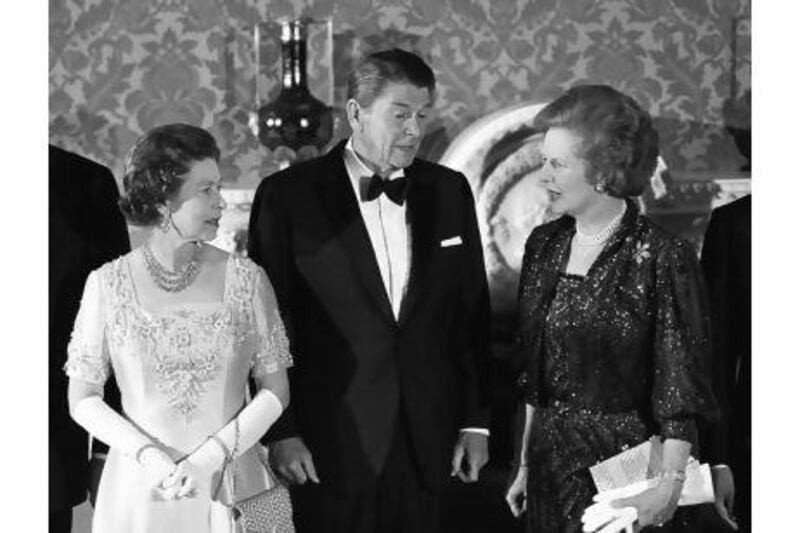LONDON // Queen Elizabeth II prepared a sombre speech in case nuclear war broke out.
Margaret Thatcher and Ronald Reagan clashed over the US invasion of Grenada as well as retribution for the bombing of a US marine barracks in Lebanon.
And the British government described Israel's involvement in the Sabra and Shatila massacres in 1982 as a case of "over-eagerness".
All the revelations are contained in a new batch of previously classified British government documents released yesterday by the British National Archives under the country's 30-year declassification rule.
The release covers the years 1982 and 1983 and shows not only the depth of fear over a possible nuclear war, but also lays bare German Chancellor Helmut Kohl's misgivings about his country's Turkish population.
World War III
"Not for a single moment did I imagine that this solemn and awful duty would one day fall to me," Queen Elizabeth might have told the British public in the event "this sad century" threw up a third world war. That, at least, according to a speech written for the monarch as part of a Nato war games exercise to fight an aggressor simply called "Orange" - omitting direct mention of the Soviet Union or the Warsaw Pact.
The exercise concluded with Britain announcing it was about to deploy its nuclear weapons and the leader of "Orange" asking for peace talks.
Grenada
Not 24 hours after telling the British parliament that she saw "no reason to think that military intervention" was likely, the US invaded the small Caribbean island of Grenada on October 25, 1983, angering and embarrassing Thatcher, who had cautioned restraint after the assassination of Maurice Bishop, the island's prime minister.
The British government - fresh from its own war with Argentina over the Falkland Islands, another conflict about which London and Washington differed - counselled the US that "unless required to save lives" an invasion would be hard to justify.
The US went ahead regardless, informing Britain only at the last minute because of "worry about leaks", Reagan later informed Thatcher. He also said he "regretted the embarrassment" caused by the lack of consultation. But according to a later British government memo, the incident left "bruises on both sides".
Lebanon
Thatcher, this time more successfully, counselled US restraint as Reagan sought revenge for the October 23, 1983, bombing of the US marine base in Beirut that killed 241 American servicemen, the most deadly single-day death toll inflicted on the US military since World War II.
Sympathising with the "pressures on you to take action", Thatcher warned Reagan in November that he faced "a fanatical people ... [who see] glory in the prospect of their own death". She also suggested that retaliation would simply "provoke further violence".
Reagan responded that he would not take military action, though he vowed to "keep open the possibility".
The bombings led to the withdrawal of the international peacekeeping force in Lebanon, which had been stationed there since the ouster of the Palestine Liberation Organisation, PLO, in 1982.
Sabra and Shatila
Francis Pym, the British foreign secretary, cleared Israel of blame for the massacres at Sabra and Shatila, two Palestinian refugee camps in Beirut, where, over two days in September 1982, a Lebanese Christian Phalangist militia killed as many as 3,500 people.
Having invaded Lebanon up to Beirut, Israel allied itself with some Christian militias fighting in the Lebanese civil war. During the massacres, the Israeli army had surrounded the camps and fired flares at night to illuminate the dark at the request of the Phalangists.
But Pym, writing an initial assessment in September 1982, said Israel had been guilty only of "incompetence, miscalculation, overeagerness to clear out the remaining PLO and unwise dependence on undisciplined militia".
A UN investigative commission later found that Israel bore responsibility for the violence.
German Turks
The documents also contain a record of a conversation between Kohl and Thatcher in which the former said he wanted to reduce the number of Turks in Germany by half.
The Turks, Mr Kohl said, were from a distinct culture and had not assimilated. Turks remain Germany's largest ethnic minority at about 4 per cent of the population.
Deliberate flooding
Thatcher's government considered flooding Kent and Essex to save London in the event that the Thames bursting its banks, after a strike had held up the completion of the Thames Barrier.
With the flooding season fast approaching, Thatcher ordered a "frank assessment" of the situation.
To spare London, one option presented her was to deliberately breach flood defences for downstream counties, Kent and Essex.
It was an option officials conceded it was "doubtful" should ever be seriously considered.
okarmi@thenational.ae
twitter: For breaking news from the Gulf, the Middle East and around the globe follow The National World. Follow us






